(Written by William)
With the New Year coming up soon, I know that many people are thinking about trying something new. As LEGO fans, we may plan a big building project, look into joining a local club, take up LEGO photography or brick-filming, participate in a building competition, publish a LEGO book, or try out other activities related to the hobby. 🙂

One interesting outlet that passionate LEGO fans may try is podcasting. In its core, podcasting is a creative outlet that allows us to talk endlessly about something we love. We talked a bit about podcasting previously when I was first invited to be a guest on The Bricks King Podcast (see: LEGO Podcasts & How to Support Them). Since then, I have participated in many of their episodes as well as in other podcasts, and now have a better grasp of the various aspects of podcasting.
As I know podcasting is something many LEGO fans are curious about, I thought to share a brief rundown on what you would need to start your own podcast, as well as some of the issues you might encounter in your podcasting journey. By the end of this article, you should have a basic idea of what is required for podcasting, and if it is something you would like to try.
➡ LEGO PODCAST – EQUIPMENT
The bare minimum you can get away with involves a microphone, a headset, a computer, recording software, and an account with a server to host your podcast. This is a suitable setup for someone just getting started and looking to do a solo show. Growing your show might be tricky with this setup since it doesn’t help with handling additional hosts. You can find basic to advanced podcasting equipment on Amazon.
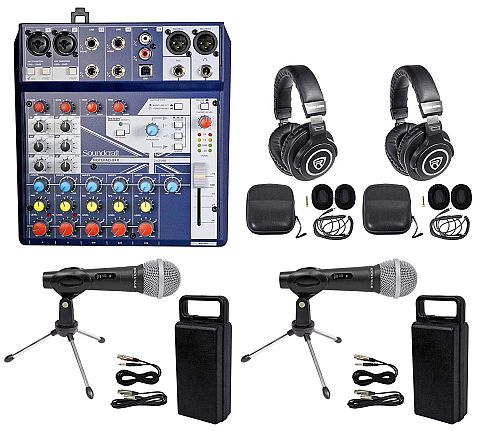
The price for a decent microphone and headset will probably run you around $50 for each. As for the software, you should be able to get by with Audacity, a free, open-source, cross-platform audio recorder and editor. Your computer should run one of the newer operating systems to make sure you don’t run into compatibility issues, and for your server, you will need to do some research to compare various pay structures and features.
If you end up liking podcasting and you want to expand, you will probably want to get a mixing board and maybe upgraded software. Extra microphones might also be needed if you plan to record with others locally. The mixing board on the level you’ll need will run you around $200 to $300, depending on your requirements. Again, this is not something that you need when you are just starting out, but as you expand and gain more experience, you will naturally gravitate towards upgrading.
➡ LEGO PODCAST – CONTENT
Beginner podcasters often don’t realize how important it is to structure your show. How long is each episode going to be? What sets you apart from other podcasts in the same genre? Do you have a regular schedule in mind? All these questions will determine what your show will sound like. Another important aspect to keep in mind is that it is much harder to carry a show all by yourself than it is with another host. You have to carry the energy of the show by yourself, so planning ahead helps keep you coherent and interesting throughout the entire podcast. Having segments where you cover news, opinions, and miscellaneous items can work to organize your thoughts while at the same time breaking up the monotony.
Generally, a shorter podcast can reach a bigger audience. The average person will want a show that’s easily digestible. However, there are plenty of listeners out there who want a big, beefy two-plus hour show. So, consider carefully what types of people you are trying to reach, and tailor the length of your show to that audience. A good rule of thumb is that the more hardcore of a fan base you want to attract, the longer you can make your show.
As for how to make your show different, you’ll need to think about what makes you different. Essentially, people listen to certain podcasts more than others, because they relate to the host more. I enjoy hearing from someone who shares my views, and when they end up sharing something I didn’t know about, I am pretty certain I will be just as fascinated with the topic as they are. So many people try to be the first reporting on some breaking news. Don’t get me wrong, this is exciting both for the podcaster and listeners, but it is also exhausting to always be on top of everything. And, honestly, would you rather hear someone report the news first or someone report the news best?
➡ LEGO PODCAST – ISSUES
Anyone I’ve ever worked with in the podcasting world inevitably had to deal with technical issues. In fact, while recording with Matt King over at The Brick King Podcast, we lost three shows worth of recordings due to bad audio. For this reason, having reserve episodes at your disposal is a good habit to get into. Physical illness, equipment issues, internet issues, and so much more can throw a major monkey wrench into your podcast. Being able to be consistent is a good measure to figure out whether a podcast will last or fail. It is the habits we form that make us successful in this arena.
Another common issue is vocal quality. Many people have never been trained to speak in front of an audience. It is this training that gives you a voice that people want to listen to. The ability to project your words and enunciate clearly are key elements you want to possess. You can probably find some video tutorials online that can help with this. If you don’t regularly speak in front of people and haven’t been schooled on public speaking, it is a good idea to spend some time learning this skill.
Yet another point to keep in mind is that editing tends to take longer than the actual recording. For those putting out the best quality shows, lots of editing is involved. Making sure weird sounds and dead air are cut out is a must. You’ll also end up learning about the basics of sound engineering whether you like it or not. So, there is going to be lots of time spent editing, and learning about editing.
Finally, censorship should be mentioned here as well. The policies of podcasting platforms may change in regards what is accepted and not accepted in terms of content, opinions, and language. Also, consider the fact that LEGO distances itself from topics like religion, politics, drug use, real-life violence, adult oriented graphicness, etc. Therefore, it is wise to consider how you and any guests you have present themselves.
If you live in a country where there is freedom of speech, you most likely won’t be asked to stop your podcast. However, it is still a good idea to consider such issues beforehand as they can easily fracture an audience and even bring legal action against you by a person or company. For this reason, setting down your own code of conduct right from the beginning can be very helpful. This may mean disclaimers at the beginning of each episode of your show, or something to mention to guest speakers you’ve never had on your show before.
➡ LEGO PODCAST – TIPS TO PREPARE
Before you go and launch your debut episode, here are a few things you can do to better prepare for the podcasting life. First up, engage with social media. Like it or not, most podcasters find their audience with the use of social media. They interact with fans and inform prospective fans as to what is going on. I recommend commenting on your favorite podcasts; ask questions, leave suggestions, or just say what you like about the show. This type of communication not only gives them feedback, but their responses can teach you how to handle the social media outlets of your own show.
Engaging in social media will also do something else for you; it will begin establishing your credibility in your chosen field. By sharing thoughts and interacting with others, you gain a wider base of knowledge, resources, and connections. Therefore, when people check out your podcast, they are already viewing you as a trusted authority.
And, if you are truly serious about podcasting, see about being a guest host on a podcast or two. Being a part of a successful podcast will give you a glimpse into the amount of effort that goes into such an endeavor. For me personally, I’ll probably always be a guest host, even though I have everything I need to host my own show. I know from my time being a guest that there is a lot to do and I don’t have that kind of time.
Finally, search out resources. Familiarize yourself with where you can access press-releases for news in your chosen genre. Find people you trust when it comes to opinion pieces. Find royalty free music to spice up the intro for your show. And look for additional material to help fill out your show notes. Perhaps you want to do an audio diary of your own LEGO creations. Having something like LDraw or LEGO Digital Designer so that you can share digital versions of your projects might be a good idea. And you’re going to need to have some level of competence using that mosaic program or that print on demand site where you share your LEGO inspired merchandise.
Ultimately, you’re going to want to be a fan of your own show. That is the easiest way to direct yourself. You can simply ask, what do I want in a show like this? And any answer you give will be right for you. Plus it’ll really help when it comes to editing.
If you would like to get an idea of what a LEGO podcast sounds like, I recommend checking out The Bricks King Podcast. They have new episodes every Thursday. Below, I have included a couple of recent episodes I participated in, And you can also go to their podcast page directly to listen to the other episodes. They are great to listen to while building, sorting your LEGO bricks, doing some work around the house, or driving.
What do you think? Do you listen to LEGO podcasts? Or would you like to star one? And have you ever participated on a podcast as a guest? Feel free to share your thoughts, questions, and own experiences in the comment section below! 😉
And you might also like to check out the following related post:



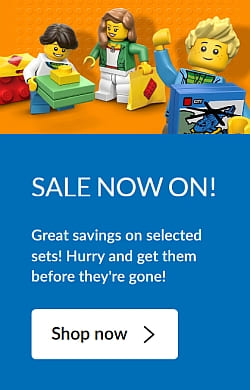
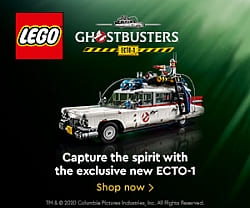
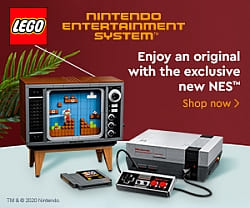
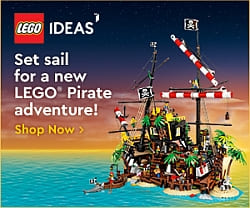
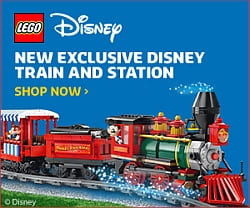
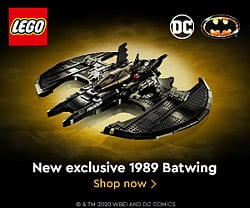
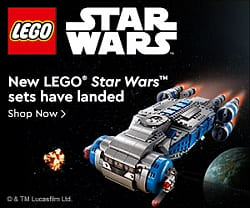
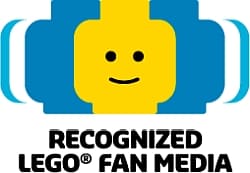

I think you have to be pretty outgoing to be a podcaster. AFOLs are often introverted. I rather build than talk about Lego.
It definitely helps to be extroverted. But I do know of people who are painfully introverted and wanted to change. They used podcasting as a way to help themselves become more confident.
They are still introverted people, but often feel better because they can express themselves.
Not necessarily. When hosting a podcast, you are in a way building up a persona. So it might paradoxically be easier to speak to a bigger audience than a smaller one. Particularly if the audience is more or less anonymous.
I agree on the point of planning the podcast beforehand, though.
How do podcasters make money? I mean, somehow they have to pay for all that equipment and their time. BTW, I really like the episodes with Will.
I think they get sponsors? But I don’t know how that works. I like to listen to podcasts while driving. It’s a good distraction and interesting. There are podcasts on practically every subject you can imagine.
Great question!
Getting paid to podcast only happens to those really dedicated. Here are a few revenue streams that are the most likely.
First, PayPal donate button. Those who like the show can often find a direct way to get it off the ground and keep it going.
Second, platforms like Patreon. This is like PayPal donations, but it has a bit more structure. Plus the content creators can give some extra benefit to those who support like special episodes, early access to content, etc.
Third, having a direct sponsor. Would you believe there are actual people you can hire to connect you directly with a company that wants to advertise to your audiance? You’ll recognize these since the advertisement is regularly on the podcast and usually done by the podcaster themselves. There could even be a special code you can use that may track a comission the podcaster gets.
Fourth, sometimes the platform you use may have an advertising program. For instance Podbean, where The Bricks King Podcast is on, uses a program like this. It tracks stats in various regions and if a company in that area are a good match then those listeners will hear a commercial. If that’s the case, the podcaster will receive a little compensation for that.
However, a great majority of podcasters I know do have to shoulder the burden of up front costs for a while.
Normally the rule of thumb is the more content you create and the more regular you are at putting out content then the easier it is for you it is to create a revenue stream.
Podcasts are great. I don’t know about lego podcasts but I will check out the episodes. I don’t think I will ever start my own. I just can’t think of what to talk about week after week. You have to be really dedicated.
Very true. The work around to that is to space out your podcasts. Once a month or four times a year are possible. Or you can do a serial style where you have a ten show run that you pre-record.
But honestly, podcasting would have to become another hobby.
Those are some great suggestions I haven’t thought of. I just assumed everyone does the once a week thing. But you are right, there is no reason to do it that often. It can even build up anticipation if you advertise on social media between episodes that are more spread out, like you said.
Good episodes! Question; is the brick king family friendly? I wouldn’t mind listening to the episodes with my kids. But I don’t want any adult language or materials.
Yes, the Bricks King is family friendly.
Matt shares the hobby with his own son plus he teaches elementary school kids, so he’s very attentive to giving fans a very clean show.
It’s one of the reasons I don’t mind being a guest! 😀
I used to love to play reporter when I was a kid. I suppose, if you can’t think of anything else to talk about, you can always just interview people. Sort of like what beyond the brick does. It still feels weird though to just talk about Lego as it is such a visual medium. But I guess you can always talk about news, rumors, history, answer questions, ask people about their projects, etc. It sounds fun!
Truthfully, you hit the nail on the head as to why there probably aren’t more LEGO podcasts. It is something much more suited to a vidual medium.
Of course, that side of the hobby has its own bit of expense. Plus taking a pic of a set and presenting a set in such a way that looks good are two totally different sets of skills.
With podcasting you can still have show notes that link to pics and content and dealing with just the sound quality is a bit simpler then sound, visual, additional graphics, and taking the time to actually get stuff built.
I think as long as you make a little effort in staying informed you always have your own opinion to fall back on when it comes to talking about things.
Heck, I know of a board game podcaster who just does a five minute news brief. It’s surprising how quickly five minutes can fly by.
This is just a suggestion to Will, but maybe you should let us know when you are in the episodes. I like your style. 😀